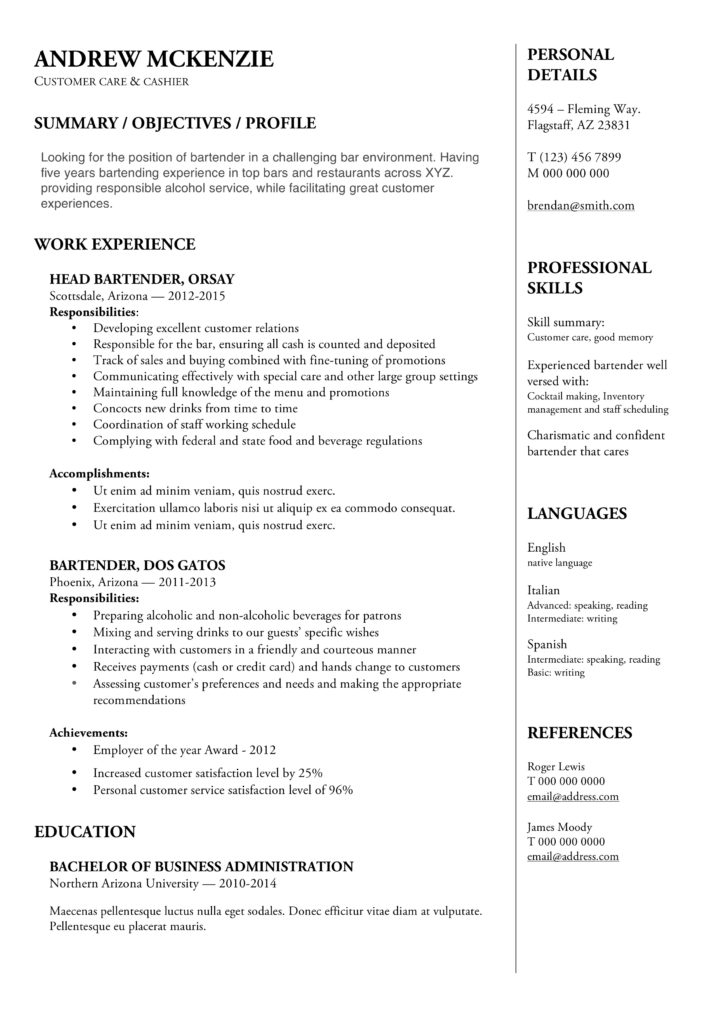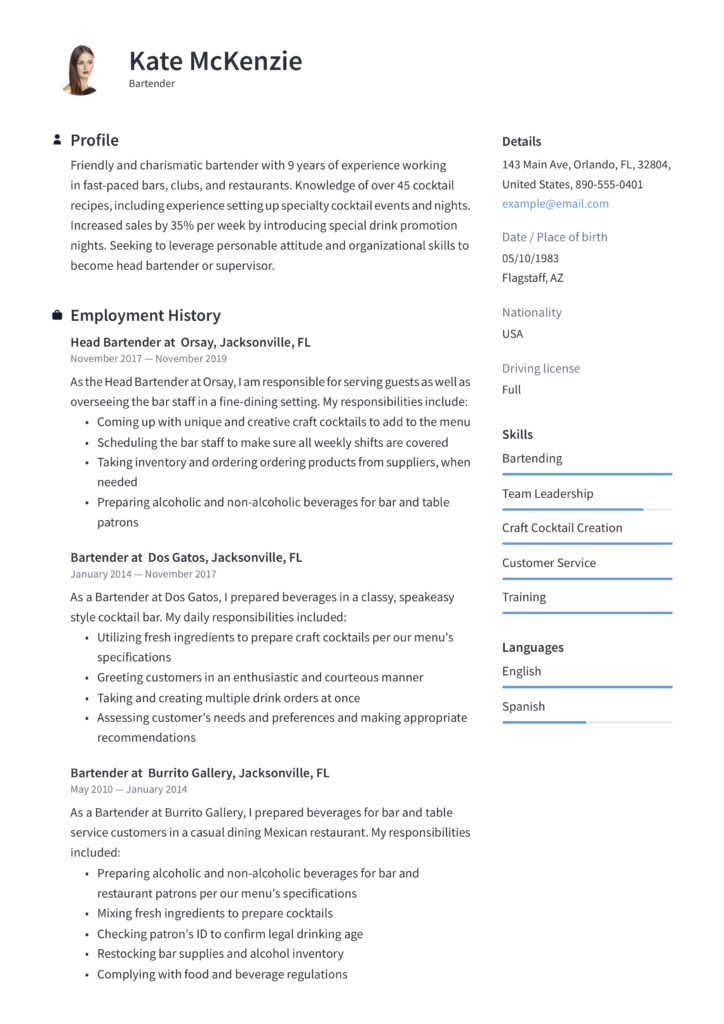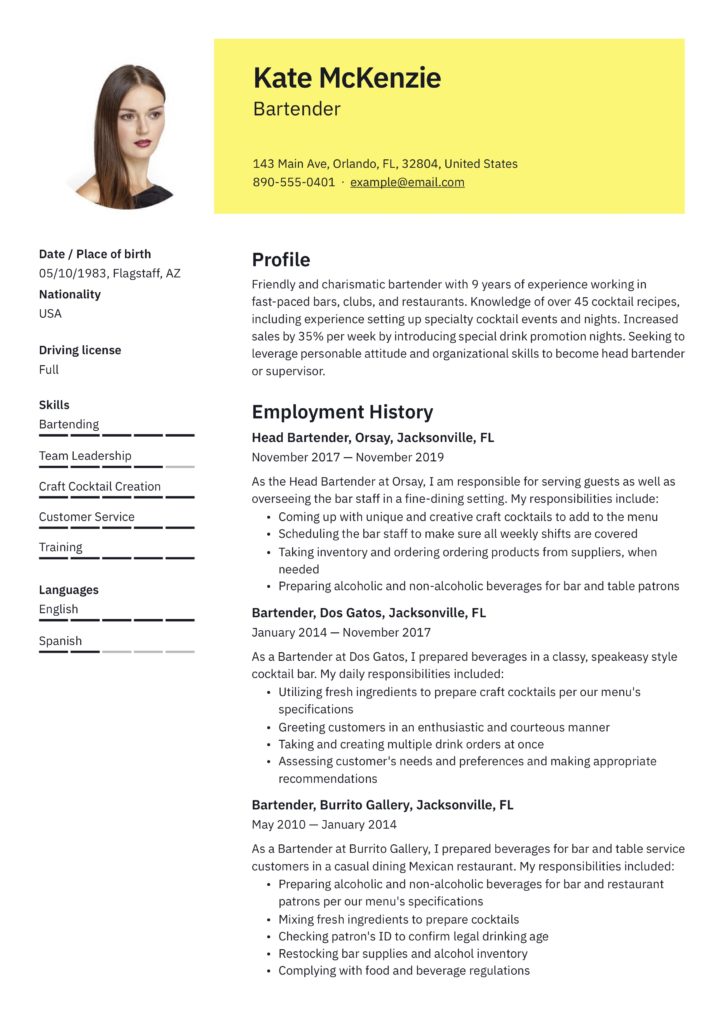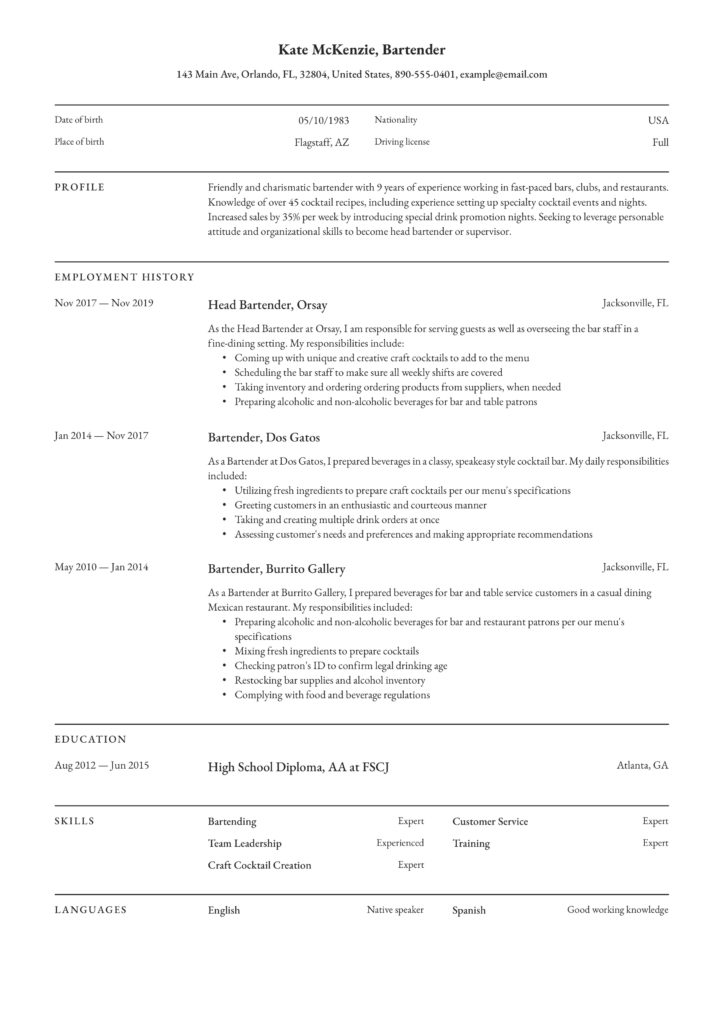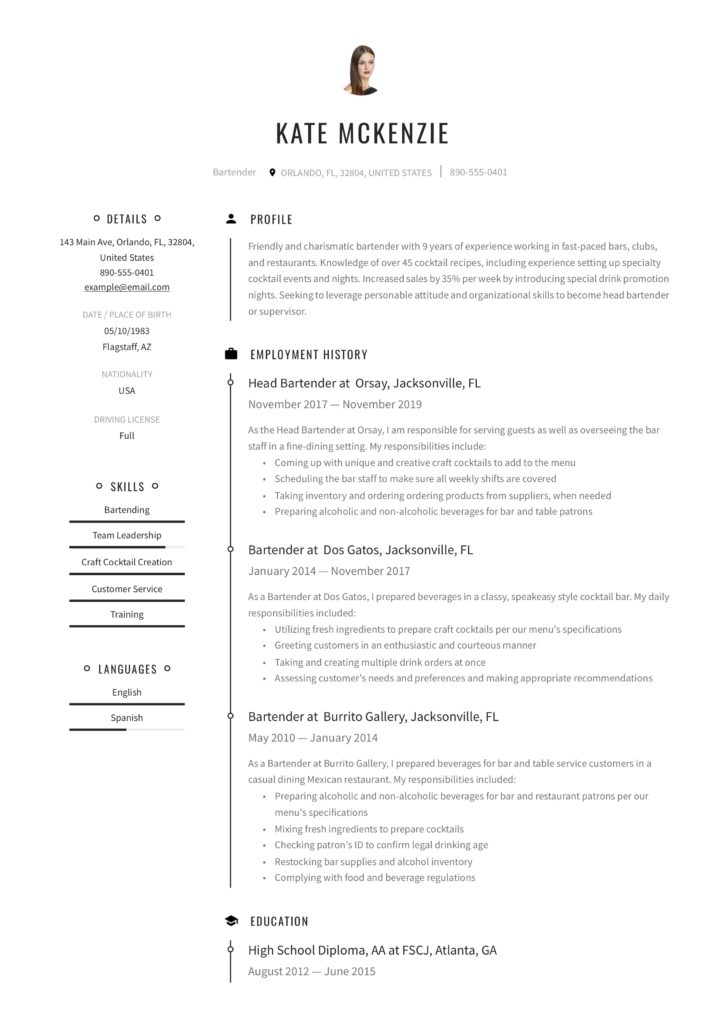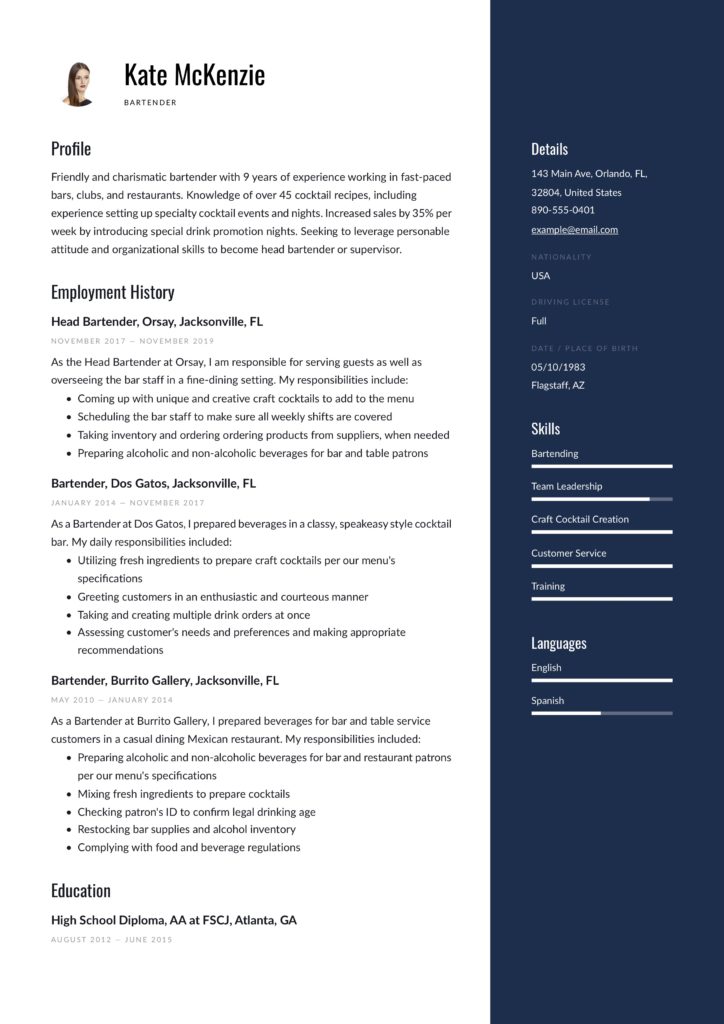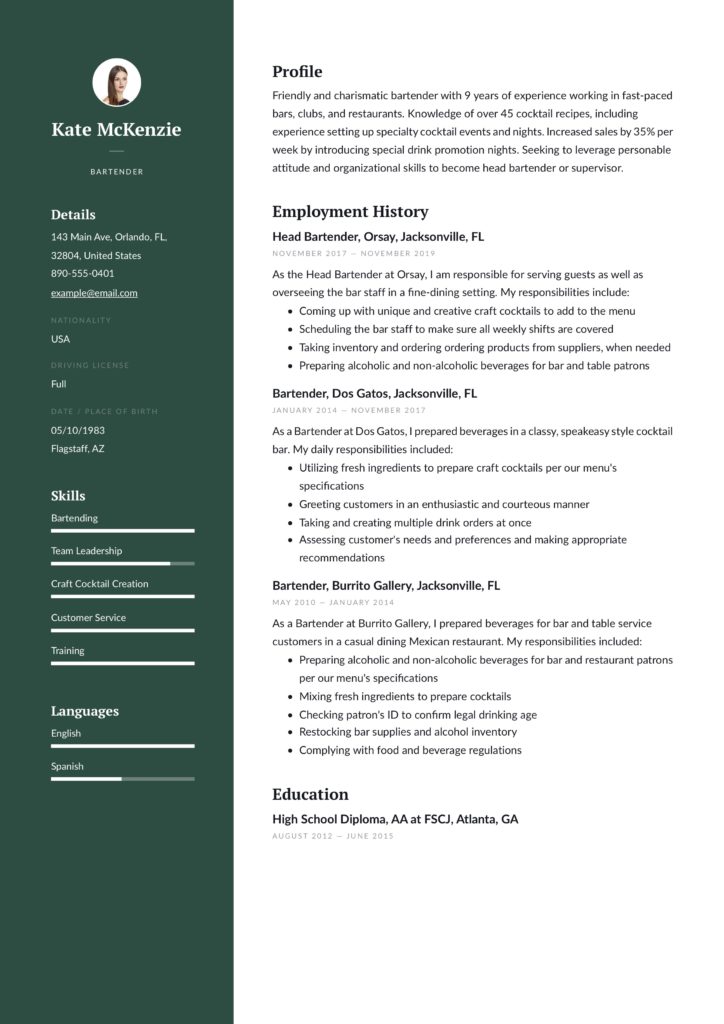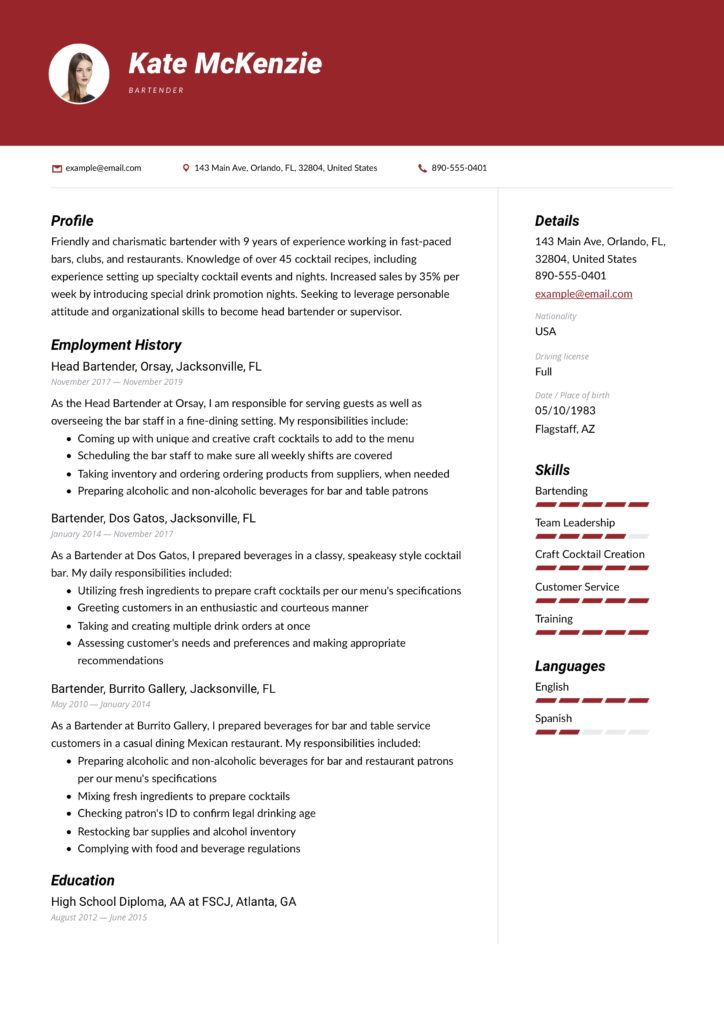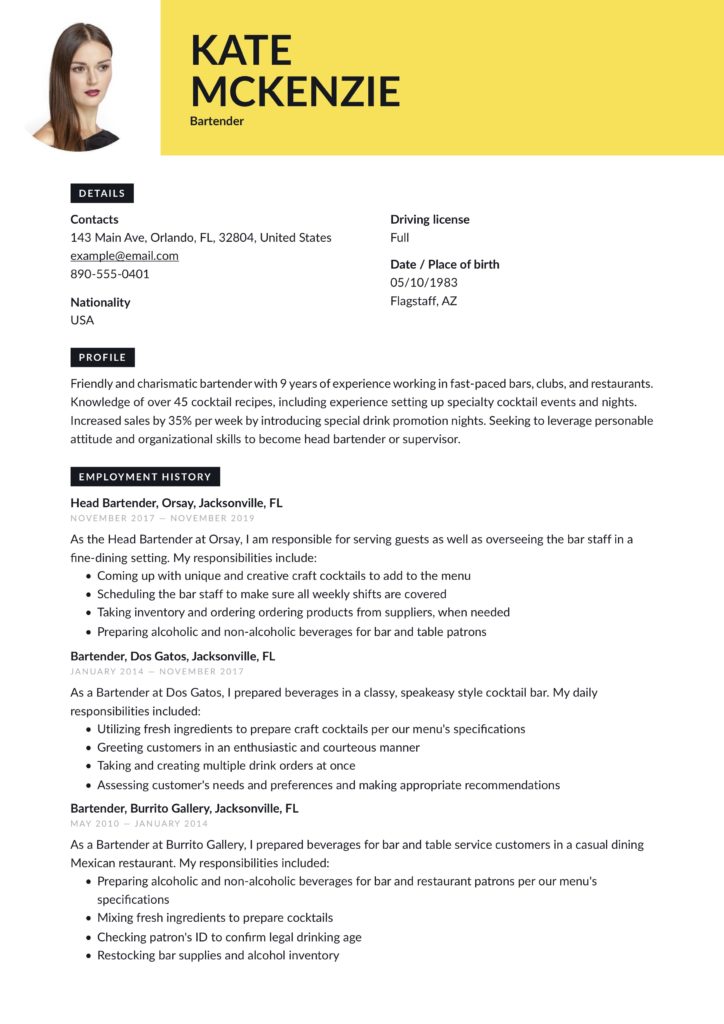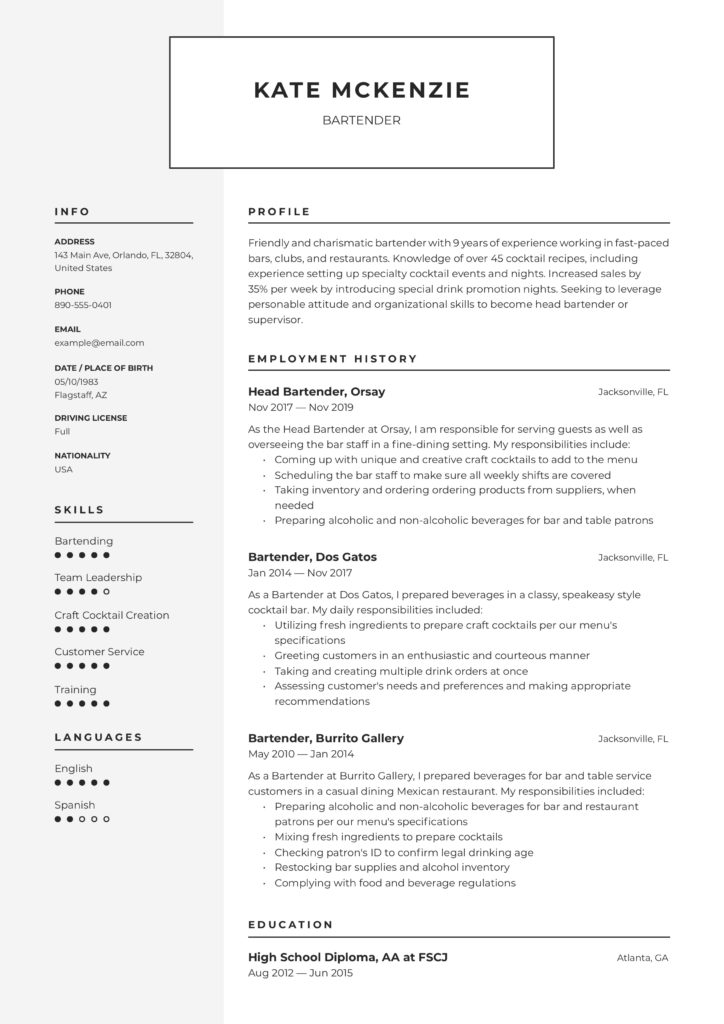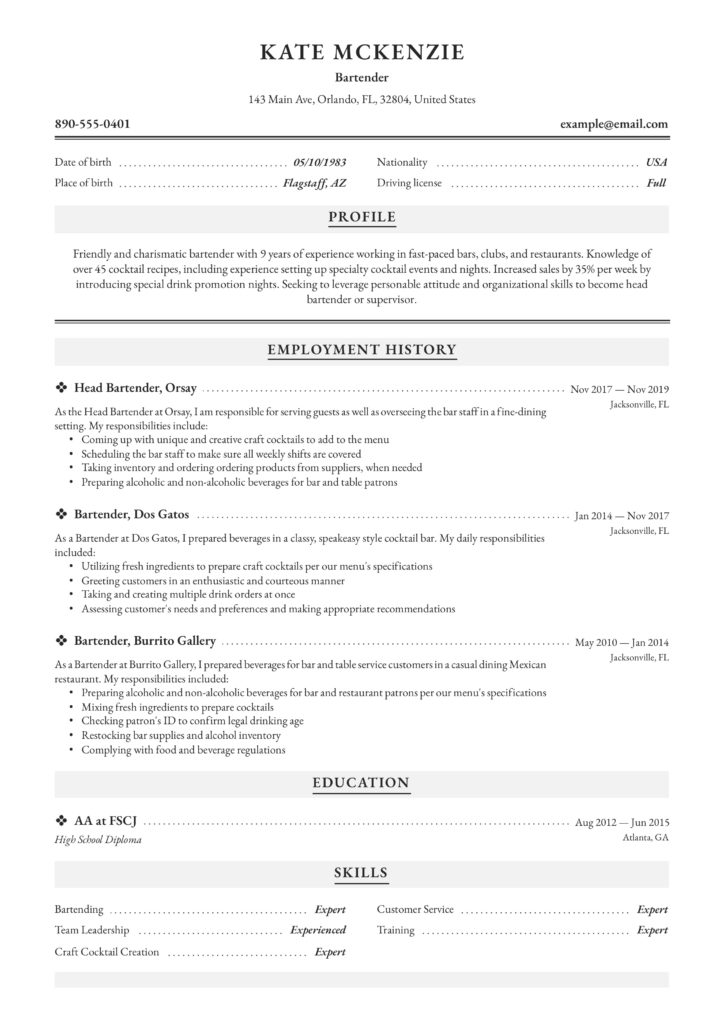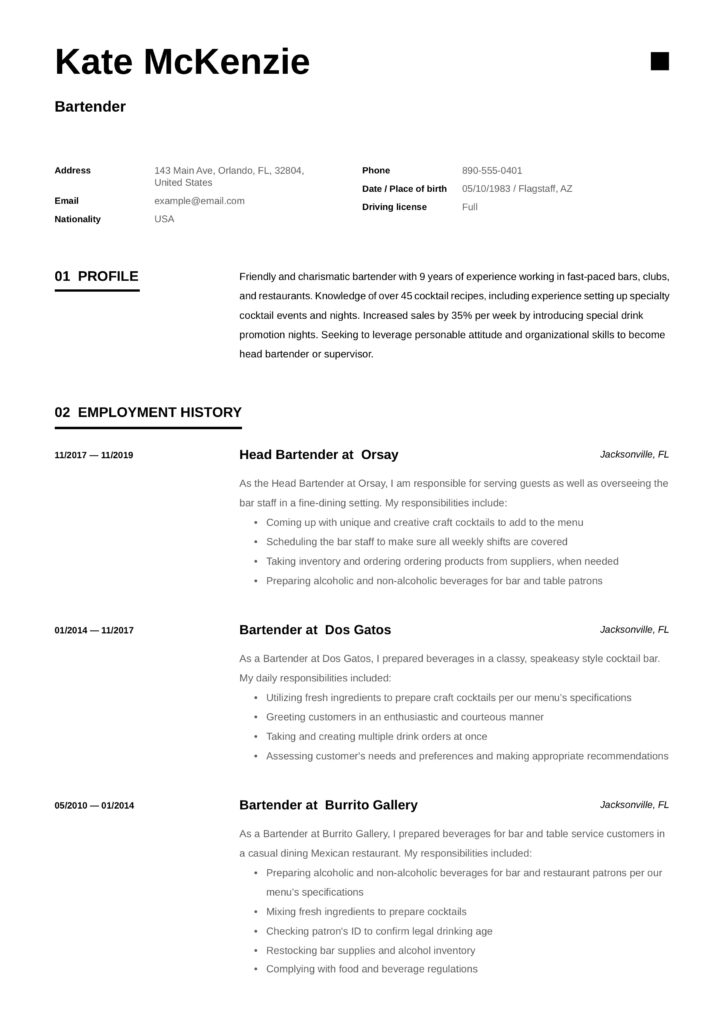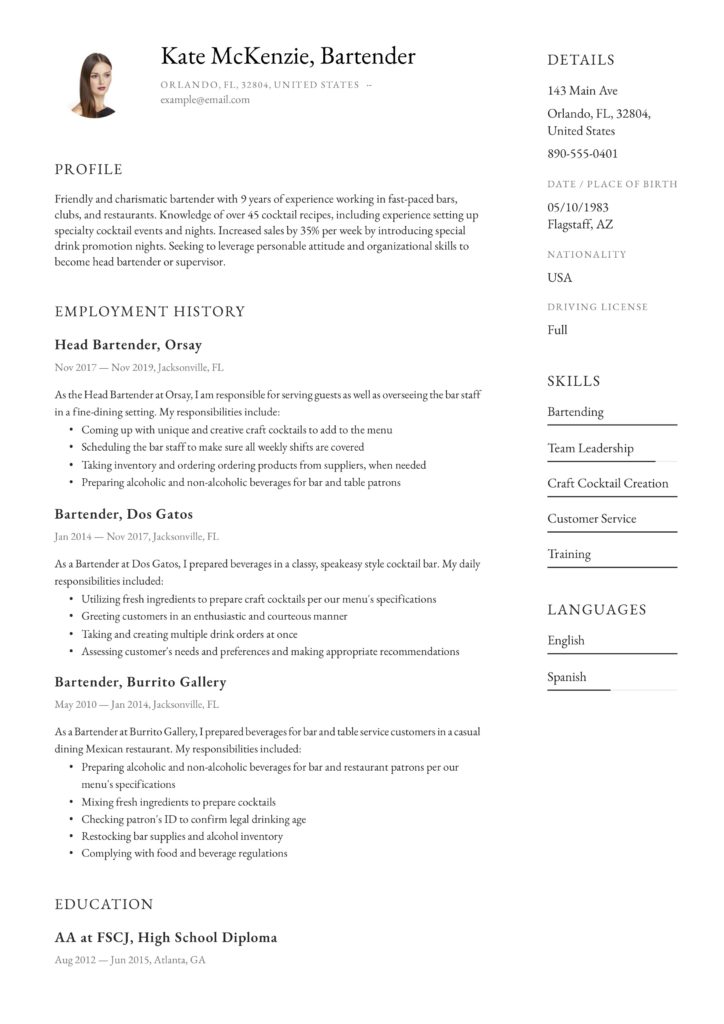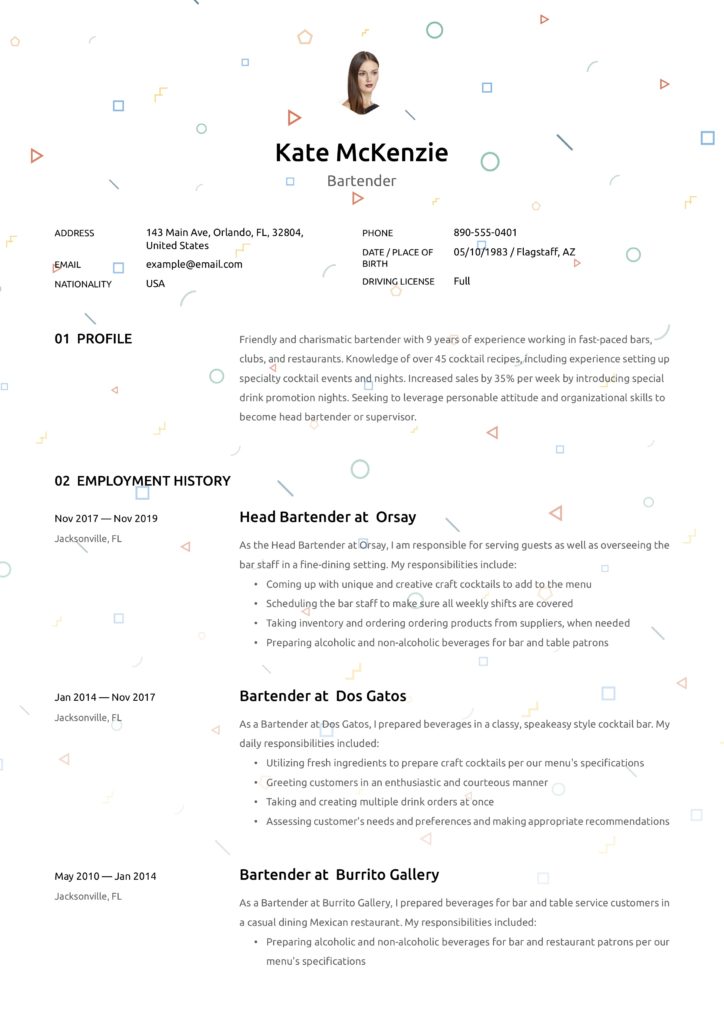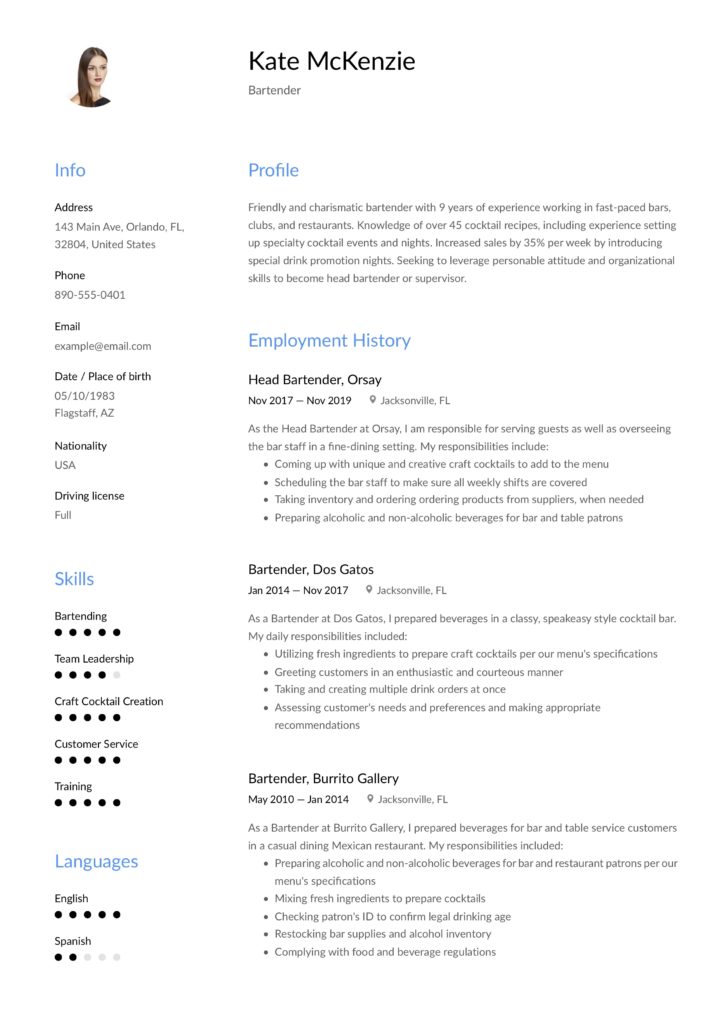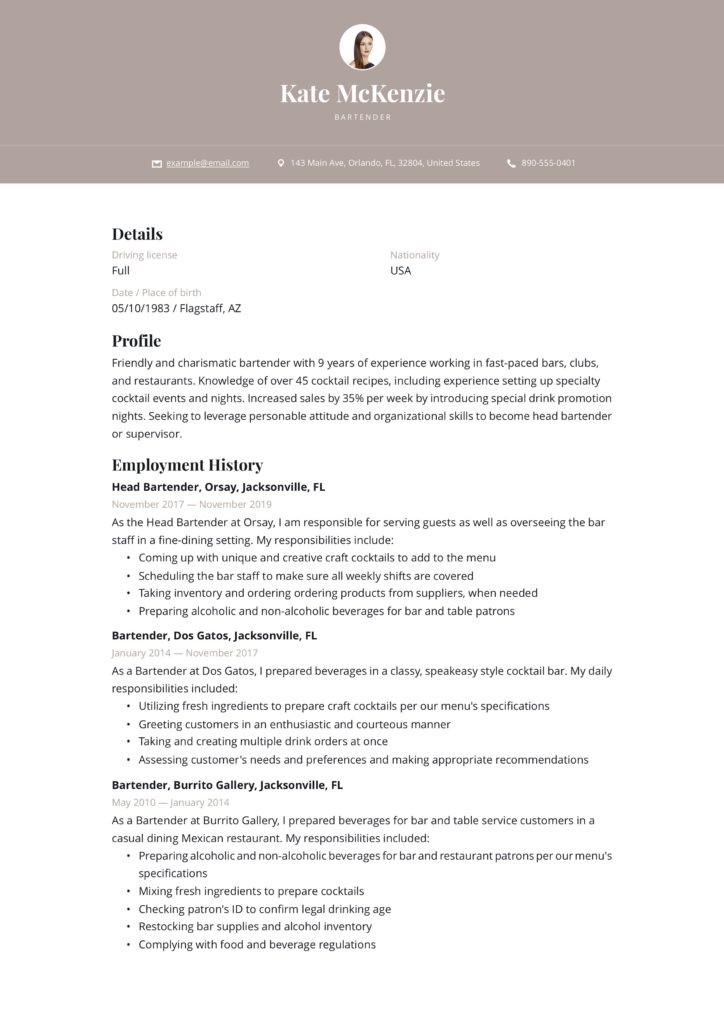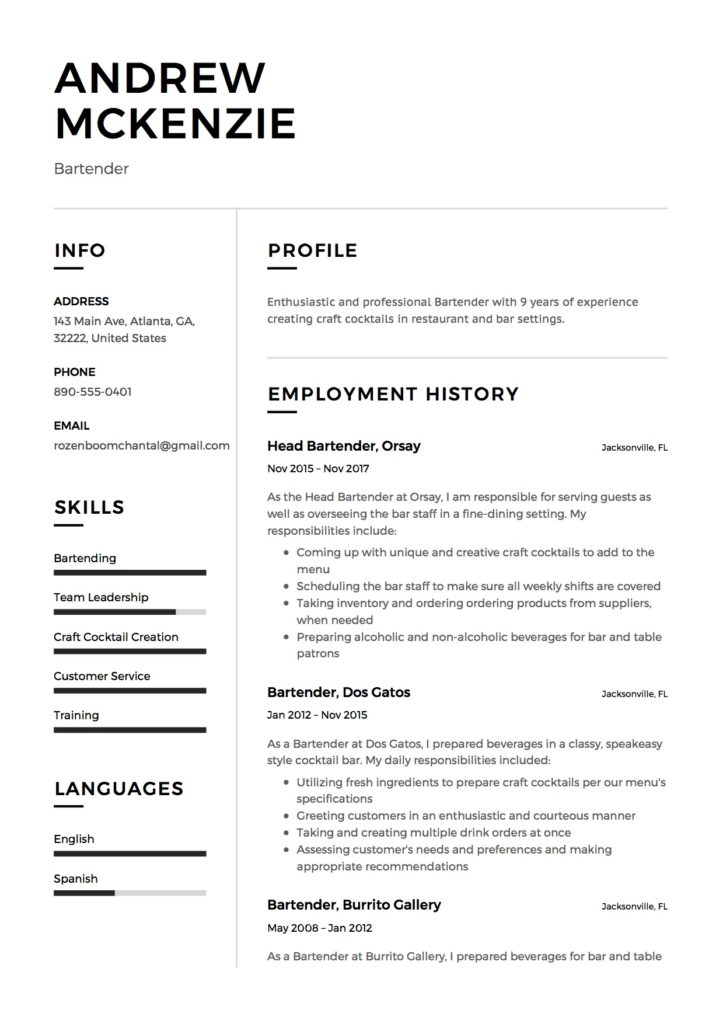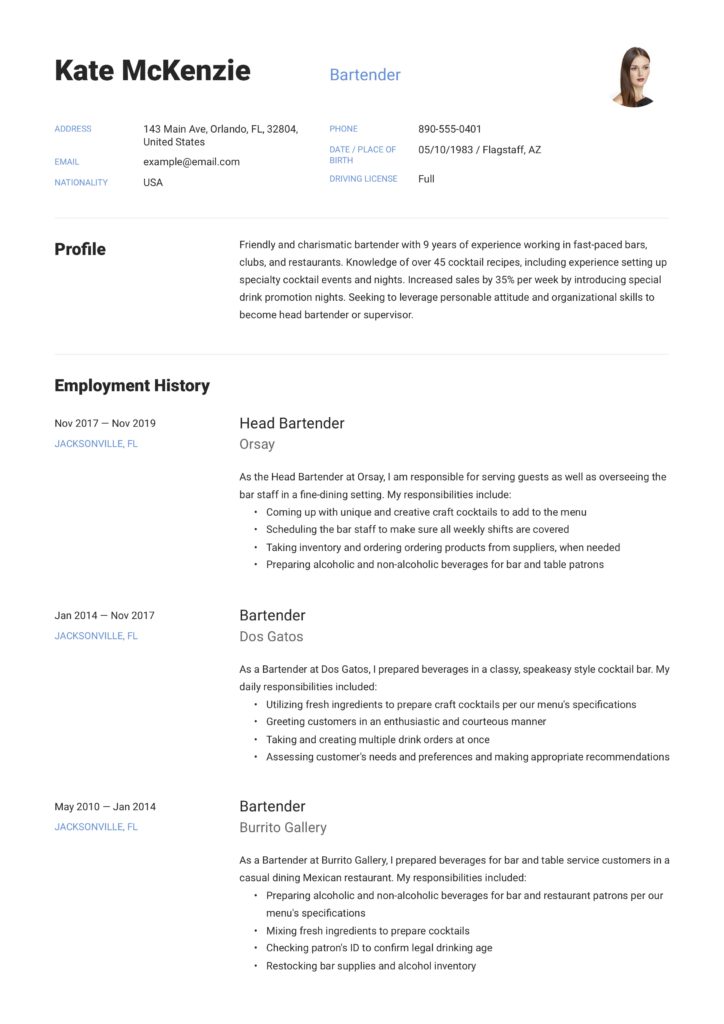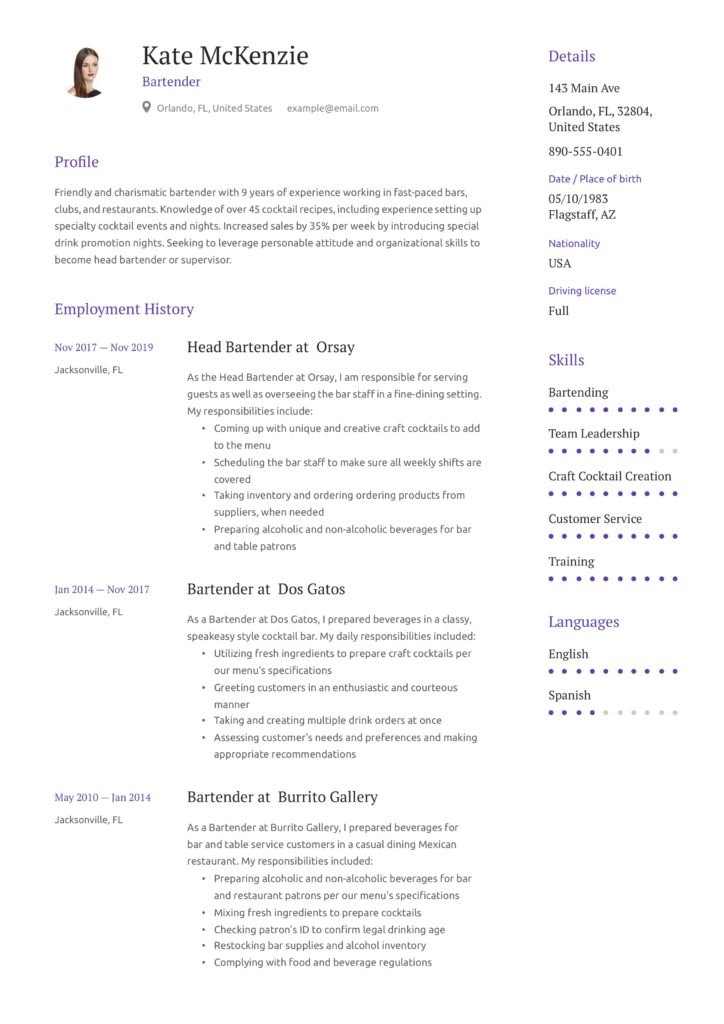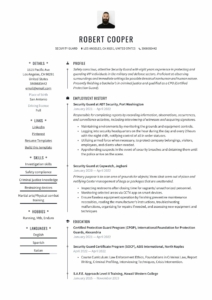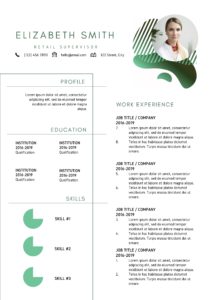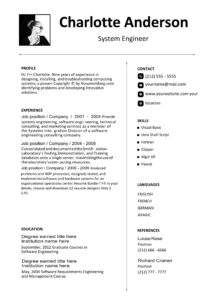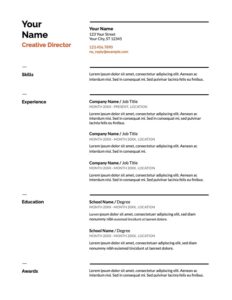Crafting an exceptional bartender resume is your key to unlocking exciting opportunities in the dynamic and fast-paced world of hospitality.
As a bartender, your resume serves as your introduction to potential employers, showcasing your skills, experience, and personality.
In this comprehensive guide, we'll explore the essential elements of a standout bartender resume, providing you with invaluable tips and strategies to craft a document that will make you stand out from the crowd.
Whether you're a seasoned bartender looking to advance your career or someone passionate about entering the field, this guide will equip you with the tools you need to land your dream job in the thriving hospitality industry.
What you can read in this article
20 Bartender Resume Examples
These bartender resumes have been made with Resume.io. Click the button below to make your own. Edit freely and download all possible templates ($2,95). Good luck!
These bartender resumes Pdf samples have been made with Resume.io. Click the button below to make your own. Edit freely and download all possible templates ($2,95). Good luck!
The Great Bartender Resume Guide
Bartender Resume Sections
Contact Information
- Name
- Address
- Phone Number
- Alternative contact channels, such as LinkedIn or Facebook Messenger, may also be listed.
What to Highlight as a Bartender
Depending on how far along you are in your bartending career, you are going to want to highlight different things
For both beginner and seasoned bartenders, it is essential to identify the type of bar settings you have worked with.
Examples are a pub, a craft cocktail bar, a fine dining restaurant, a hotel bar, or special events. If you have worked in a restaurant, identify the type of restaurant.
For example, casual dining or fine dining. If you aren’t sure what kind of restaurant you have worked in, you can review the breakdown below:
Casual Dining– Serves mid-range priced foods in a casual setting. Orders are taken at a table by a server. Casual dining restaurants typically have a full bar. Examples include TGI Friday’s, Cracker Barrel, and Olive Garden.
Fine Fining– Full-service restaurants with dedicated meal courses. Higher-end décor and prices. Often have dress code rules, in addition to strict guidelines for bartenders and restaurant staff to follow.
Another important thing to highlight is what types of beverages you were serving. Employers want to know if you have made fresh craft cocktails or if you have just poured beer and wine and been entertaining the guests while doing that.
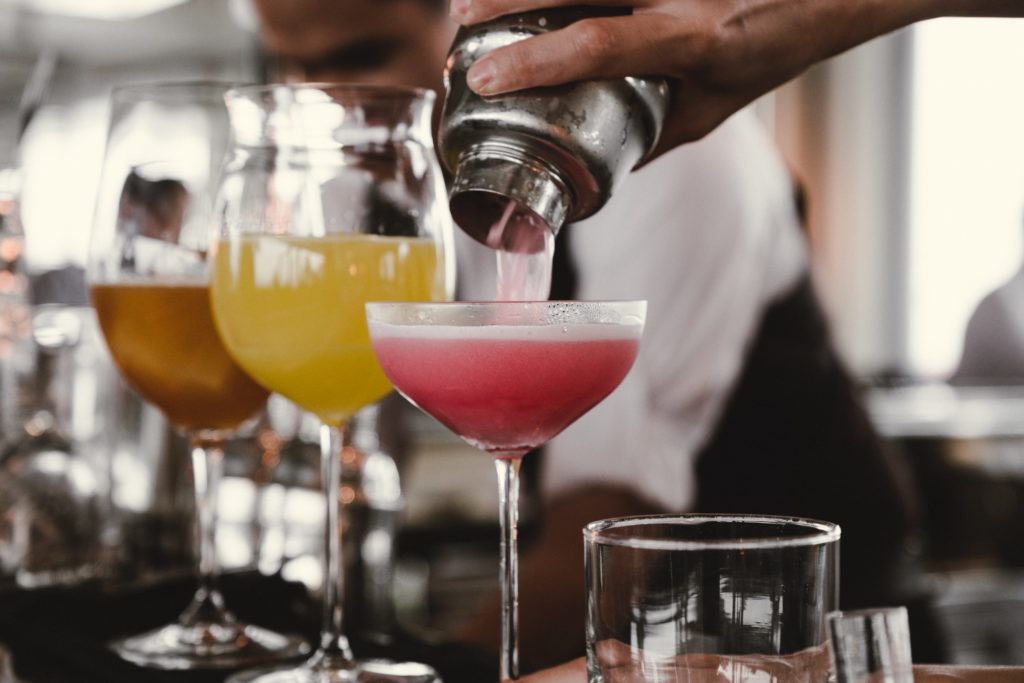
Work Experience Examples
Whether you are just starting your bartending career, or are a seasoned veteran, employers are expecting you to be familiar with the basics.
To make sure your resume is what employers are looking for, try incorporating the following job descriptions and responsibilities.
Tip: Scan the job posting for keywords to include throughout your resume document.
General Bartender Job descriptions
- Preparing alcoholic and non-alcoholic beverages for patrons
- Mixing and serving drinks to our guests' specific wishes
- Interacting with customers in a friendly and courteous manner
- Receives payments (cash or credit card) and hands change to customers
- Assessing customer’s preferences and needs and making the appropriate recommendations
- Checking customer’s ID to make sure they are of legal drinking age
- Entertains waiting for customers
- Complying with federal and state food and beverage regulations
- Communicating effectively with special care and other large group settings
- Conducts proper housekeeping to ensure the cleanliness of the bar area
- Taking and creating multiple drink orders at once including cocktail making
- Responsible for opening and closing of the establishment
- Performing in high-pace and pressured environment
- Maintaining full knowledge of the menu and promotions
- Worked diligently to assist co-workers when necessary
- Developing excellent customer relations
- Responsible for training new employees
Experienced Bartender (3+ years)
- Creating new items to add to the bar menu
- Restocking and replenishing bar supplies and alcohol inventory
- Creating promotions and deals of the day
- Working with beverage suppliers to test and purchase new products
- Training new bartenders and facilitating shadow days
- Attended a weekly wine course to learn and promote our wine list
Lead/Head Bartender
- Concocts new drinks from time to time
- Created marketing strategies, event planning and social and print media to increase sales
- Responsible for the bar, ensuring all cash is counted and deposited
- Track of sales and buying combined with fine-tuning of promotions
- Reporting daily and weekly sales reports to management
- Coordination of staff working schedule
Cocktail making
- Mixing fresh ingredients to prepare cocktails
- Utilizing fresh ingredients to prepare craft cocktails per our menu's specification
Bartender Skills & Examples
A bartenders' main duty is to serve and prepare drinks. While so, provide a hospital, caring, and entertaining atmosphere while building momentum with the guests.
Bartenders typically have a personal interest in helping, service, and persuasion areas, according to the Holland Code framework.
These traits help tremendously in naturally being a good bartender. So if you are new to the scene, pay attention as to what skills and traits to list, to get you on the radar as the perfect new bartender in town!
If you are not sure whether you have a Helping or Persuading interest, which largely fits with a career as a bartender, you can take a career test to measure your interests.
Bartenders should posses and highlight these soft skills:
Communication. Bartending is communication. Throughout your shift, you take orders, have constant chatter with guests and colleagues. All in a clear and friendly manner, in a possible high-paced environment. Passionate bartenders enjoy working in settings just like this!
Half the communication is being a listener, a receiver. Carefully listening to customers, diet wishes, life stories, and everything in between.
A good bartender chats away with any customer while staying friendly and professional. And ideally, with a smile on the face. Actual listening makes the communicator and forms relationships that make customers return.
Should you detect intoxicated customers, are you able to deny further service to those individuals in a friendly and caring manner?
Organization. Bartenders are more often than not, busy running their bar, multiple guests, and multiple orders. A bartender keeps track of all that, while also remembering who paid, who is still waiting, and who and what comes in the venue.
Organizations allow the bartender to keep a clear overview of the bar and mind in hectic times. Knowing you stocked up all items before rush hour, cleaned the bar, and have everything in place, frees up the mind to rock the shift with your team.
Vibe creation. Vibe creation? Yes! It all starts with the greeting of a bartender when you come in as a guest.
Having the guests seen that the bartender has noticed and welcomed you, is the kickstarter of vibe creation. It helps the customer to manage the expectation of having to wait until the bartender has a moment to care for you personally.
A good bartender reads his clients. Who up for a little chatter? Who is up for a joke? Who can be charged up with your energetic and engaging attitude? Bartending is a diverse job with many skills.
Most skills being soft skills. Comedy, conversation, psychology, persuasion, entertainment. And of course: making stunning drinks!
Customers and guests come to a pub, bar, or restaurant, looking for atmosphere.
To show employers that you have the skills they are looking for, try to incorporate these skills into your profile, key skills, and cover letter sections:
42 Example Bartending Skills to Consider
| Good memory | Friendly | Engaging |
| Knowledgeable | Organization | Creative |
| Professional | Courteous | Composure |
| Communication | Inventory Management | Customer Service |
| Cash handling | Time Management | POS Systems |
| Energetic | Accuracy | Attention to detail |
| Monitoring Alcohol Consumption | Basic Math | Dependability |
| Attentiveness | Multitasking | Sense of Humor |
| Interpersonal skills | Stamina | Assertiveness |
| Integrity | Team Work | Critical thinking |
| Initiative | Credit Card processing | Efficiency |
| Diet and Allergy knowledge | Outgoing | Memory |
| Reliability | Flexibility | Appearance |
| Cleanliness | Persuasive | Uplifting |
Common Bartender Certificates
- Food Handler
- TIPS Certified
- TABC
- ServSafe
- Driver's Licence
- First Aid
- Introduction to Bartending
- Liquor Laws
Quantifying Your Successes
Employers love numbers because it makes your experience more tangible. When writing your bartender resume or curriculum vitae, if you can answer the questions, “How much?” or “How many?”, you should try to include that number. For instance:
- How many customers did you serve per shift?
- What was your daily alcohol sales? Food sales?
- How many bartenders did you train?
Bartender Action Verbs
Never make your professional experience sound like a passive list of daily tasks. Instead, help potential employers envision you performing the job by using these bartender specific action verbs:
| Prepairing | Serving | Suggesting |
| Cleaning | Interpreting | Organizing |
| Greeting | Taking | Making |
| Inputting | Completing | Training |
| Estimating | Analyzing | Running |
| Applying | Working | Showing |
| Ordering | Checking | Calculating |
| Recommending | Advising | Hosting |
Related Cover Letters
Click here to download a bartender cover letter sample.
Bartender Word Resume Download
Next to this specific Word resume, we have over 60 free word resumes to download for free. Definitely worth checking out if you can find your way with Microsoft Word!
